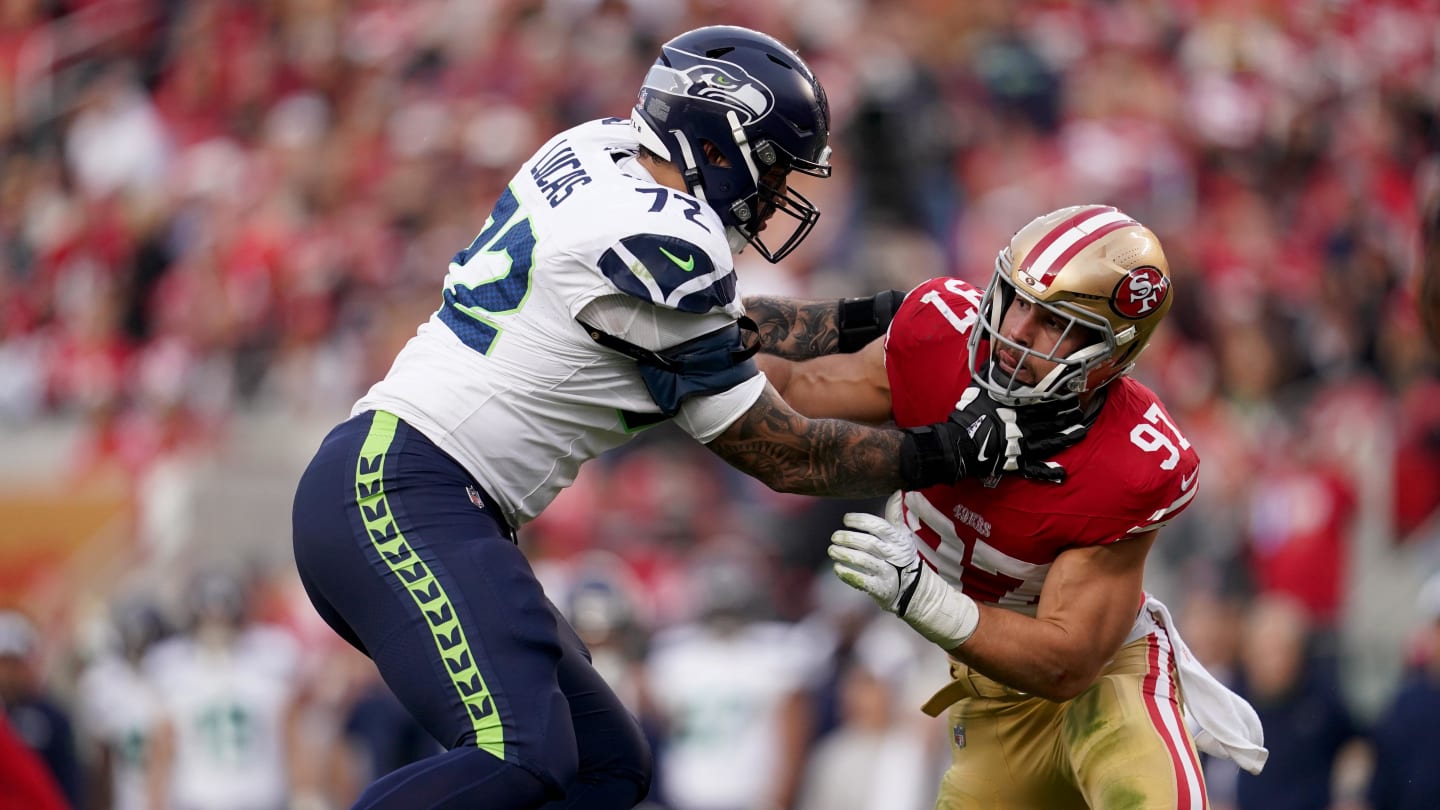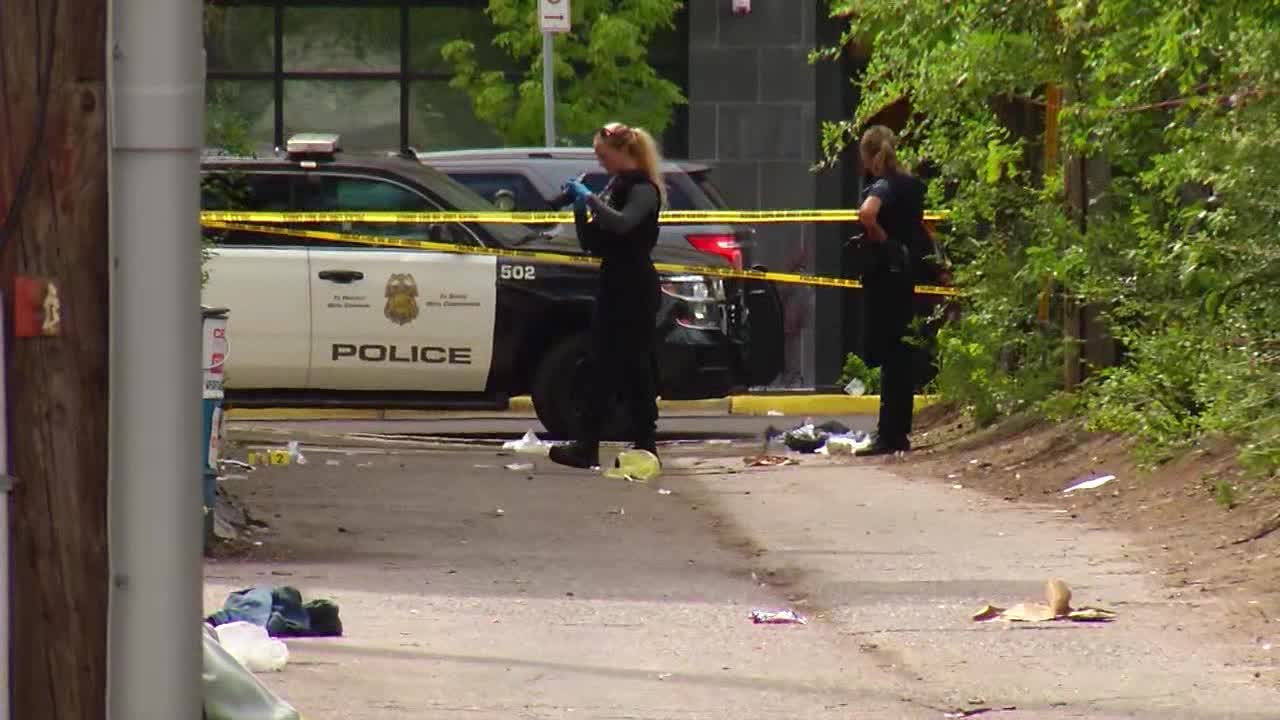Politics
Litman: Trump's hush money trial is about to go to the jury. What's the most likely verdict?

After 20 days, 22 witnesses and intermittent courtroom fireworks, the evidence in Donald Trump’s New York hush money trial is all in. The case will soon be in the hands of the jury.
Who holds the advantage at this critical juncture? My assessment, after attending much of the trial in person, is that it’s the prosecution’s case to lose.
With the standing caveat that it takes only one juror to block a unanimous guilty verdict — and that the law puts the greatest burden on prosecutors — the case as it has come in puts the district attorney’s office in the driver’s seat going into next week’s closing arguments.
The prosecution’s essential achievement was to provide a compelling, credible narrative that points toward only one plausible conclusion: that Trump is guilty as charged.
The defense, by contrast, took a scattershot approach focused on undermining the credibility of any and all of the prosecution’s witnesses, particularly Michael Cohen, Trump’s former attorney and fixer. But what Trump’s lawyers didn’t do is provide a counternarrative, a story compelling enough to leave jurors with a reasonable doubt as to which explanation of the facts is true.
Providing such a competing story isn’t the defense’s legal obligation, of course. The judge will instruct the jurors that if they have any reasonable doubt about the prosecution’s case, they should vote to acquit.
But my experience as a trial lawyer suggests a difference between freestanding doubt about one or more witnesses and a broader doubt about the rationale behind the charges — an alternative plotline that jurors might find believable. That’s the kind of defense being presented on behalf of Sen. Robert Menendez, for example, who is arguing that his wife is the guilty party.
From the first day of testimony, the prosecution has presented a tight, persuasive tale. It begins with an August 2015 meeting involving Trump, Cohen and tabloid executive David Pecker — who explained it to the jury from the stand — in which the parties agreed on a scheme to smother negative stories about Trump.
And sure enough, before the next year’s election, a series of scandal-mongers required neutralizing to insulate Trump from political damage. These episodes are akin to Acts II and III of the script, falling into place along the tracks that the Pecker testimony laid.
Hope Hicks’ testimony was brief but powerful given her longtime loyal service to Trump and her obvious candor notwithstanding her reluctance to harm her former boss, which seemed to cause her to break into tears. She confirmed in dramatic terms that Cohen and Allen Weisselberg, the Trump Organization’s then-chief financial officer, would not have cooked up the scheme to pay off the adult-film actor Stormy Daniels without Trump’s say-so.
The prosecution effectively corroborated in advance most of what would come from its last and most important witness, Cohen. At the same time, the prosecutors encouraged their own witnesses to disparage Cohen, lowering expectations before he took the stand.
When he did, Cohen was low-key, responsive and agreeable. With a few exceptions, he accepted the insults the defense served up, accounting for most of the discrepancies in his story by explaining that he had been telling the truth since he left the Trump fold.
A couple of low points in Cohen’s testimony got a lot of attention, and it’s natural for the media to zero in on dramatic moments. But the jury is more likely to evaluate the evidence in the context of the whole narrative and a witness’ general comportment.
Most important, jurors, like all of us, make overall judgments about credibility, which is the heart and soul of the jury system. Taking the measure of the people before them, they decide whether their accounts are basically trustworthy, notwithstanding the defects of the messengers. And all the stories in this case — not just Cohen’s but those of other flawed witnesses such as Pecker and Daniels — cohere and ring true.
It follows that the impertinence of Robert Costello, a defense witness who muttered in disagreement with Judge Juan M. Merchan’s rulings, probably caught the jury’s attention more than the flaws in Cohen’s largely even presentation — especially once Merchan forcefully rebuked Costello’s buffoonish grandstanding.
The prosecution’s cross-examination of Costello and redirect of both Cohen and Daniels were crisp, clear, textbook demolitions of the defense’s points. Trump’s team was more meandering and given to stray potshots, missing more than they hit.
I think the defense still has one largely overlooked escape hatch: the arcane legal instructions for deciding the felony charges. The charges require the prosecution to prove that Trump caused the alleged falsification of documents to further another crime. Prosecutors have offered up three different candidates for that other crime, each of which has flaws. I could see the jury, which includes two lawyers, considering the legal instructions very carefully and finding that the district attorney came up short. And in any event, the issue is sure to figure in an appeal.
But any appeal feels a millennium away. By the time that transpires, Trump will either be president, giving him extensive options for evading accountability, or a losing candidate facing three other criminal trials. This trial looks increasingly likely to be the only opportunity for a jury to decide for the first time whether a former president is a criminal. Going into the final act, I like the chances that he will be found guilty.
Harry Litman is the host of the “Talking Feds” podcast and the Talking San Diego speaker series. @harrylitman

Politics
Biden strikes gold in California, one week after Trump's massive haul in the blue bastion
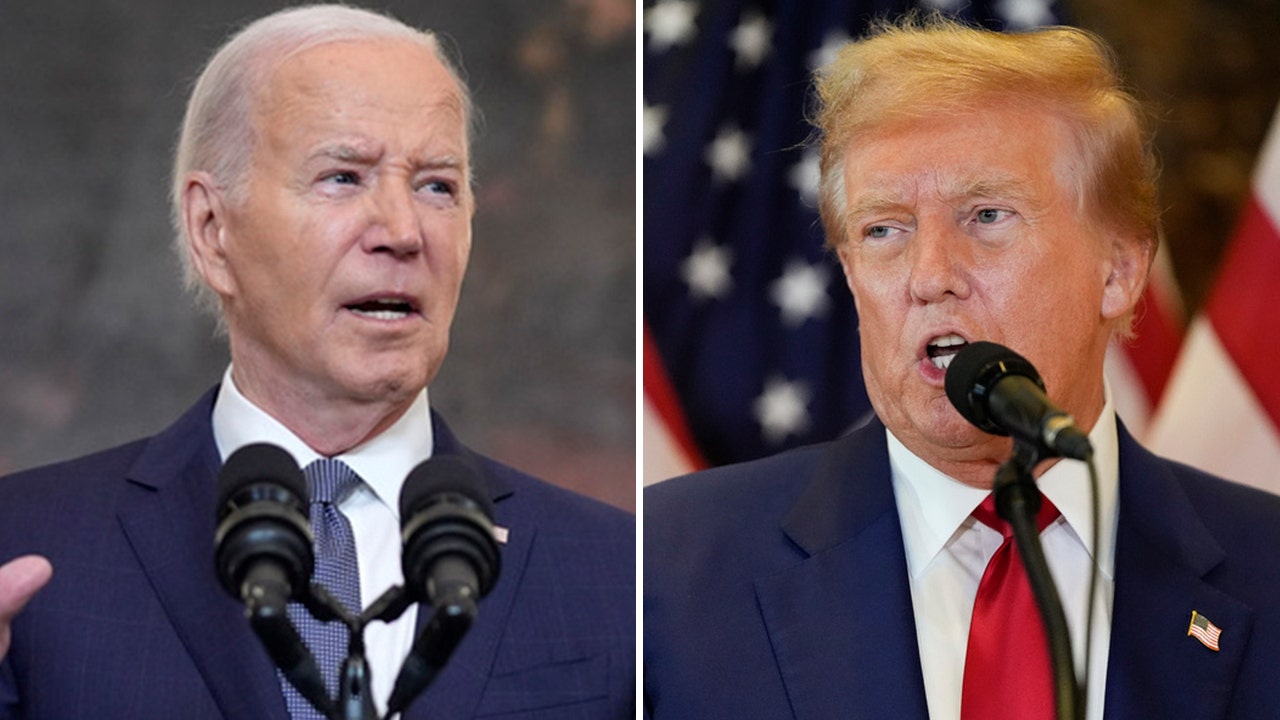
After former President Trump’s lucrative, three-day swing through California, President Biden has returned to the West Coast to tap into the Democrat-dominated state’s political ATM.
With less than five months to go until the November election, late-night TV host Jimmy Kimmel will interview Biden and former President Obama as they team up with Hollywood heavyweights George Clooney and Julia Roberts at a star-studded fundraiser the president’s campaign said is already breaking records.
Biden’s campaign boasted “the event has already raised over $28 million and counting — making it the biggest fundraiser in Democratic Party history.”
The haul tops a fundraiser with Biden, Obama and former President Clinton in March at New York City’s Radio City Music Hall, which raked in $26 million.
TRUMP HAULS IN PLENTY OF GREEN DURING SWING THROUGH LONGTIME BLUE STATE
Former presidents Clinton (right) and Obama (left) and President Biden (center) headline a Democratic Party fundraiser at Radio City Music Hall March 28, 2024, in New York City. (Getty Images)
But Trump, the presumptive GOP nominee, hauled in over $50 million in early April at a fundraiser at the Palm Beach, Florida, home of billionaire investor and hedge fund founder John Paulson. It was the most money ever brought in at a single fundraising event and shattered the record Biden set just a week and a half earlier at Radio City Music Hall.
It’s the latest case of national politicians coming to California to pad their campaign coffers. According to figures from the Federal Election Commission, Biden and Trump have raked in more money in California this cycle than any other state.
“When politicians look to the west, they see a field of green,” veteran California-based political scientist Jack Pitney at Claremont McKenna College told Fox News.

President Biden and former President Trump have both hauled in millions at fundraising events in California as they face off in their 2024 election rematch. (AP Photo/Julia Nikhinson and Evan Vucci)
Tickets for Saturday’s gala at the Peacock Theater in downtown Los Angeles, which an invitation describes as a “historic night,” ranged from $250 for a single person to get in the door to half a million dollars for special access, photos with Biden and Obama and invitations to an after-party.
The president arrived in California one week after Trump left the Golden State.
Trump’s team said when all the money is counted, the presumptive Republican presidential nominee was expected to haul in roughly $27.5 million from three fundraisers in California and one in Las Vegas, a senior campaign official told Fox News.
WHY TRUMP’S SAN FRANCISCO FUNDRAISER WAS FRUITFUL IN MORE THAN ONE WAY
And the Trump campaign said an additional $6 million was raised for outside groups supporting his 2024 election rematch with Biden.
Trump has been aiming to close his fundraising gap with Biden. In April, his campaign and the Republican National Committee (RNC) for the first time raised more than the Biden campaign and the Democratic National Committee.
Trump’s campaign announced a week ago it and the RNC hauled in a stunning $141 million in May, fueled in part by the former president’s guilty verdicts in his recently concluded criminal trial.

Former President Trump appears in Manhattan Criminal Court May 30, 2024, in New York. (AP Photo/Seth Wenig, Pool)
Trump was found guilty of all 34 felony counts in the first trial of a former or current president in the nation’s history.
The former president’s campaign noted that, in the first 24 hours following the verdict, it and the RNC brought in nearly $53 million, which counted toward May’s total.
The Biden campaign has also been raising money from the Trump verdict, and a source told Fox News “the 24 hours after the verdict were one of the best fundraising 24 hours of the Biden campaign since launch.”
While Trump’s California fundraising haul was fueled by top-dollar GOP donors, including tech industry investors and hedge fund giants, Saturday’s fundraising for Biden is being orchestrated by the Democratic Hollywood machine.
It’s no surprise. The entertainment industry, which showered presidents Clinton and Obama with campaign cash, has long been known for its Democratic leanings.
And while the 81-year-old Biden doesn’t have the tight relationships with Hollywood that his Democratic predecessors enjoyed, he can still draw a crowd.
“Any Democratic presidential candidate is going to be able to raise a lot of money in California, and an incumbent president has a big advantage. When the president enters a room, it fills up with cash,” Pitney said.
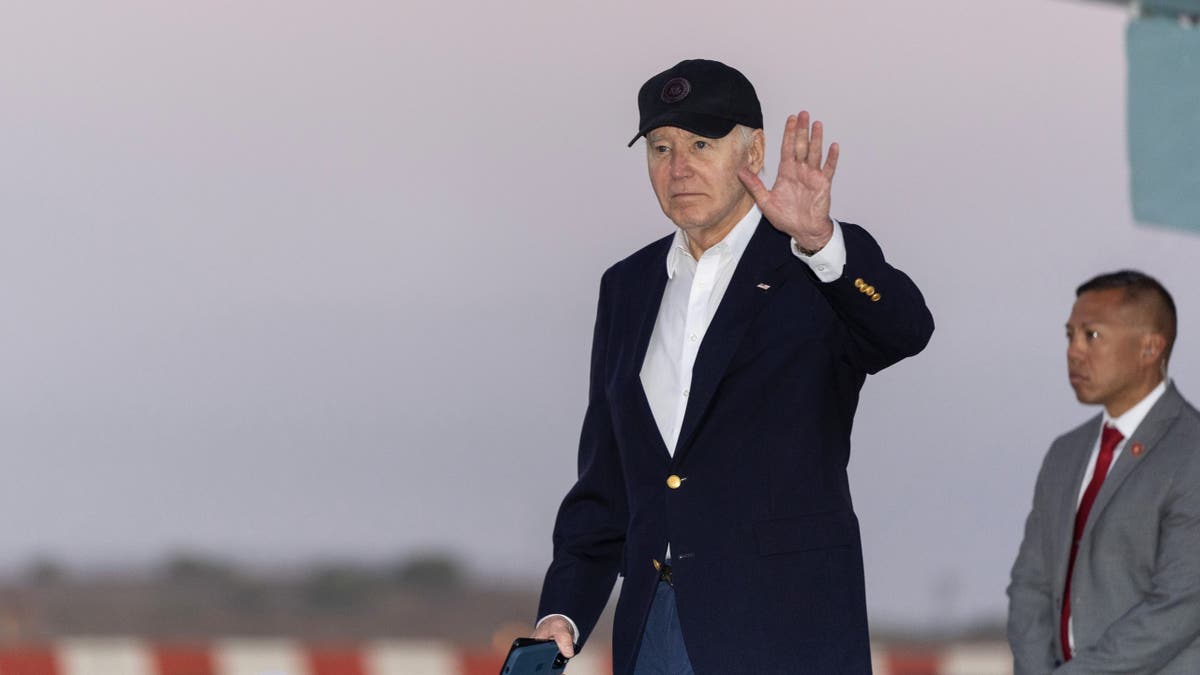
President Biden waves as he arrives on Air Force One June 15, 2024, in Los Angeles. Biden will attend a campaign event Saturday night. (AP Photo/Alex Brandon)
Major strikes by two Hollywood labor unions representing film and television writers and actors from May through November of last year delayed Biden from raising money in Los Angeles entertainment circles.
But the president started making up for lost time in December with a major fundraiser hosted by famed directors Steven Spielberg and Rob Reiner. Saturday’s mega-fundraiser was orchestrated by media mogul and Democratic rainmaker Jeffrey Katzenberg, who’s a Biden campaign co-chair. Katzenberg also put together the Radio City Music Hall fundraiser.
The Biden campaign and the Democratic National Committee have enlisted the help of plenty of stars and well-known performers from the entertainment world as the president runs for a second term.
Among those lending a hand is famed actor Robert De Niro, who headlined a Biden campaign news conference outside the New York City courthouse during the final days of Trump’s trial.
The news conference went viral after De Niro, who portrayed mobsters in such cinematic masterpieces as “The Godfather Part II” and “Goodfellas,” screamed at nearby Trump supporters that “You are gangsters” as they yelled obscenities at the actor.
Actor Mark Hamill, who portrayed Luke Skywalker in the Star Wars saga, made a recent unannounced appearance at the White House briefing room to praise the president and called Biden “Joe-Bi-Wan-Kenobi.”
Spielberg has helped the DNC with its storytelling efforts, and Academy Award-winning actress Octavia Spencer campaigned with Vice President Kamala Harris on a recent swing through battleground Michigan.
Trump, whose final California fundraiser took place last weekend at a tony gated community in upscale Newport Beach, California, and included veteran actor Jon Voight, will spend this weekend in Michigan, holding multiple events, including a roundtable discussion at a northwest Detroit church.

Supporters of former President Trump, the presumptive Republican presidential nominee, react to his motorcade on the day he visits to raise money in Newport Beach, Calif., June 8, 2024. (REUTERS/David Swanson)
The Trump campaign argued the former president will be meeting with “everyday Americans” while “Biden will be at a glitzy fundraiser in Hollywood with his elitist, out-of-touch celebrity benefactors that own him.”
The Trump campaign and Republican allies also criticized the president for skipping a peace conference on Ukraine being held this weekend in Switzerland to appear at the California fundraiser. Vice President Kamala Harris will represent the U.S. at the peace talks.
Get the latest updates from the 2024 campaign trail, exclusive interviews and more at our Fox News Digital election hub.
Politics
Californians less likely to vote cite a common reason: They don’t like the presidential candidates
Most Californians say they’re likely to vote in the November election, but among those who aren’t sure, there’s a common reason: They don’t like the presidential candidates.
That finding comes from a poll released Friday by the UC Berkeley Institute for Governmental Studies, which asked 5,095 registered voters across California to reflect on their likelihood of voting in the Nov. 5 general election that will feature a rematch between President Biden and former President Trump.
The poll, conducted for the nonprofit Evelyn and Walter Haas, Jr. Fund, found that about 78% of California’s registered voters say they’re highly likely to vote. The poll also found that the intent to vote varies widely by age, race and political affiliation — as do the reasons why people say they aren’t likely to cast a ballot.
Californians who see themselves as highly likely to vote said participating in the presidential election is the leading reason. But among those who say they’re less likely to vote, 40% cited not liking the candidates for president as a reason. That rose to 55% among voters who have voted regularly in the past but aren’t sure whether they’ll vote this year.
Trump, a Republican, is now running as the first former president convicted of crimes after a jury last month found him guilty of falsifying records in a scheme to conceal payments to a porn actor who alleged they’d had an affair. Biden, a Democrat, is facing criticism from some in his own party over his support for Israel in its war against Hamas, as well as his moves to restrict asylum at the Mexico border. And both are facing questions about their age: Trump is 77 and Biden is 81.
“The presidential election seems to be cutting both ways,” said Mark DiCamillo, the director of the Berkeley IGS poll. “It’s a motivating factor for those who are already on board and likely to vote, but it seems to be inhibiting others.”
Democrats and liberals were more likely than Republicans and conservatives to say that their dislike of the presidential candidates is one reason they may not vote, the poll found.
More than 1 in 3 voters in the state said they weren’t likely to vote because “special interests and big money are controlling things,” and almost 3 in 10 voters said they weren’t well informed about the issues and the candidates.
“It’s clear that when it come to our politics, belief is low and cynicism is high,” Jonathan Mehta Stein, the executive director of California Common Cause, said in a statement.
California’s ballot on Nov. 5 will be a lengthy one, including the presidential election, a growing list of statewide ballot initiatives and several competitive legislative races that could determine which party controls Congress. Some races in purple areas are expected to be won on razor-thin margins.
Overall, the poll found that the groups that appear to be most inclined to vote are over the age of 65, white voters, Republicans, homeowners and those with post-graduate degrees.
The groups in which the fewest people said they were likely to vote include voters who are young, Black or Asian American, have no post-high school education, or are naturalized citizens.
“It’s pretty much what we’ve seen in past elections — that older voters, white voters, the better educated voters are the most likely to turn out,” DiCamillo said.
The likelihood of voter participation varied widely by race, the poll found. Among white respondents, 90% said they were highly likely to vote. The share was 66% among Black voters, 70% among Latino voters and 62% among Asian American voters.
The foundation provided special funding to focus on Asian Americans, California’s fastest-growing demographic group, DiCamillo said.
The poll used voter-roll information to find voters who requested voting materials in Chinese, Korean and Vietnamese, then asked the poll questions in those languages. (The poll always asks questions in both English and Spanish.)
The results give “a better read of those voting constituencies than we’ve ever had in the past,” DiCamillo said, and suggest that there are wide disparities in voting propensity among Asian Americans.
Nearly 2 in 3 Vietnamese Americans described themselves as highly likely to vote. That rate rose to 71% among other Asian American and Pacific Islander groups, including Filipino and Japanese Americans.
By comparison, slightly less than half of Korean Americans and 54% of Chinese Americans said they were likely to vote.
The poll also asked California’s registered voters what could make them more engaged in the general election.
White and Asian American voters were most likely to say that their chances of voting would rise if they felt that “ballot measures or candidates would advance my interests.”
Latinos were most likely to say that their chances of voting would increase if “election results were more trustworthy.” And Black voters most frequently said that they would be more likely to vote if they “had access to an unbiased and trusted source of news about the election.”
Christian Arana, a vice president of the Latino Community Foundation, said in a statement that investment in voter education is crucial to ensure that voters “understand the significance of their vote and the influence they hold.”
Voters under the age of 30 were four times more likely than voters over 65 to say that “getting more information about how and when to vote” could improve their changes of participation.
They were also far more likely to say that their voting behavior could change if voting were more convenient, or if they had assistance from “a person or group that I trust to help me better understand the issues and the candidates.”
DiCamillo cautioned that 78% of respondents rating themselves as highly likely to vote does not mean a prediction of 78% turnout. Most voters have good intentions about voting, he said, “but they probably overestimate it.”
During the 2020 presidential election, more than 80% of registered voters cast a ballot in California, the highest percentage since 1976.
The poll was conducted May 29 to June 4 in five languages. The margin of error for the overall sample of registered voters was estimated to be plus or minus 2 percentage points, and could be higher for subgroups.
Politics
White House says Trump’s tariffs will destroy manufacturing, exacerbate inflation
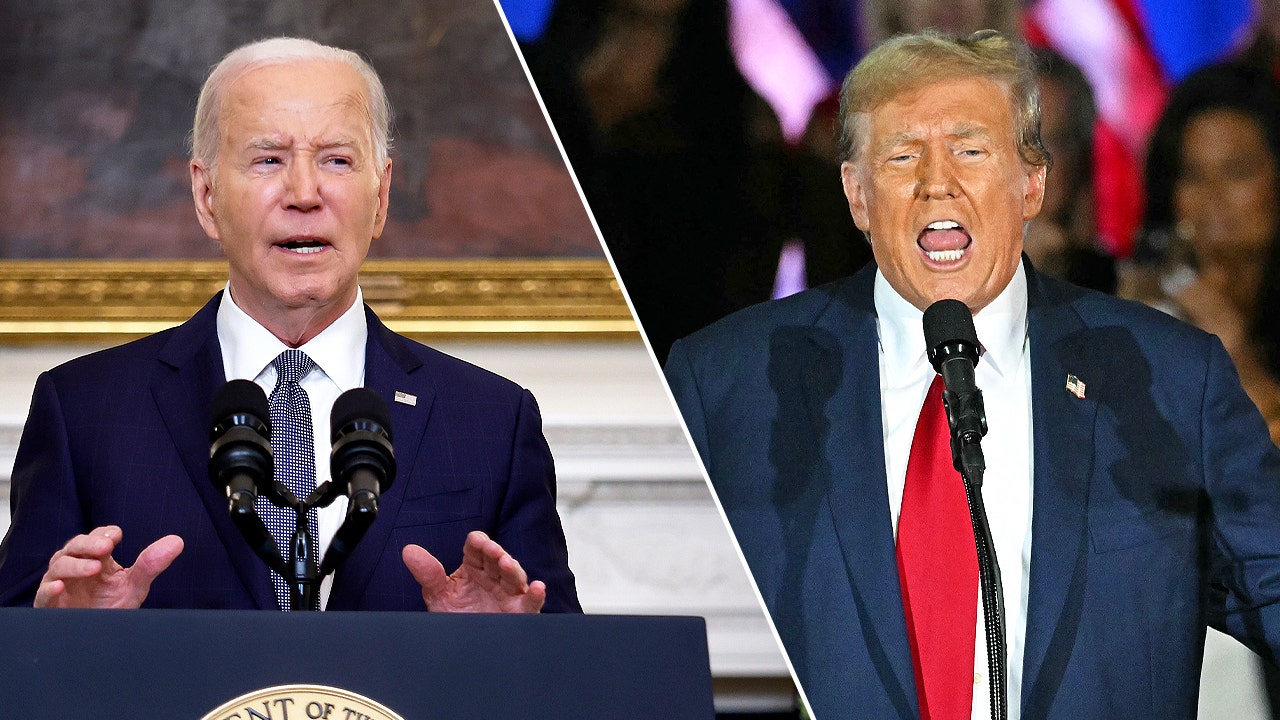
FIRST ON FOX: The White House is taking aim at congressional Republicans over their support for “MAGAnomics” and former President Donald Trump’s “across-the-board tariffs” plan, which it claims would raise prices for families and worsen inflation.
In a Friday memo to “allies and interested parties,” White House deputy press secretary Andrew Bates slammed Republicans for “targeting Medicare and Social Security for cuts, pushing tax welfare for the super-rich, and supporting across-the-board tariffs that would raise costs and taxes for hardworking families.”
“Yesterday congressional Republicans met to plot a 2025 agenda that involves historic tax increases on the middle class in the form of high tariffs, then gives tax handouts to big corporations that are overcharging Americans despite inflation decreasing,” Bates wrote.
Trump met with both Senate and House Republicans on Thursday during his trip to Capitol Hill. Rep. Thomas Massie, R-Ky., said afterward that the former president “briefly floated the concept of eliminating the income tax and replacing it with tariffs.”
TRUMP SELLS SENATE REPUBLICANS ON PLAN TO WIN OVER WORKERS IN CLOSED-DOOR MEETING
President Biden, left, and former President Donald Trump, right. (Getty Images)
“What’s more, the lead House Republican for budget issues, Jodey Arrington, recently wrote, ‘Unchecked mandatory spending on programs like Medicare, Medicaid, Social Security and welfare represent a growing threat to our economic security and potentially our way of life,’” Bates said in the memo.
Pointing to other recent reporting, Bates claimed that “in addition to extending the Trump tax giveaway for billionaires and multinational companies, congressional Republicans want even further corporate tax windfalls that will add another $1 trillion to the deficit.”
President Biden “rejects this dangerous MAGAnomics agenda,” Bates noted.
“His plan would protect and strengthen Medicare and Social Security, further cut the deficit by making rich special interests pay their fair share, and to crack down on the corporate greed that is ripping off American families as inflation falls,” he wrote in the memo. “Republican officials have stood against every aspect of that plan, even defending junk fees and price gouging.”
‘TOTAL LIE’: TRUMP CAMPAIGN, GOP LAWMAKERS BLAST REPORT CLAIMING HE CALLED MILWAUKEE A ‘HORRIBLE CITY’
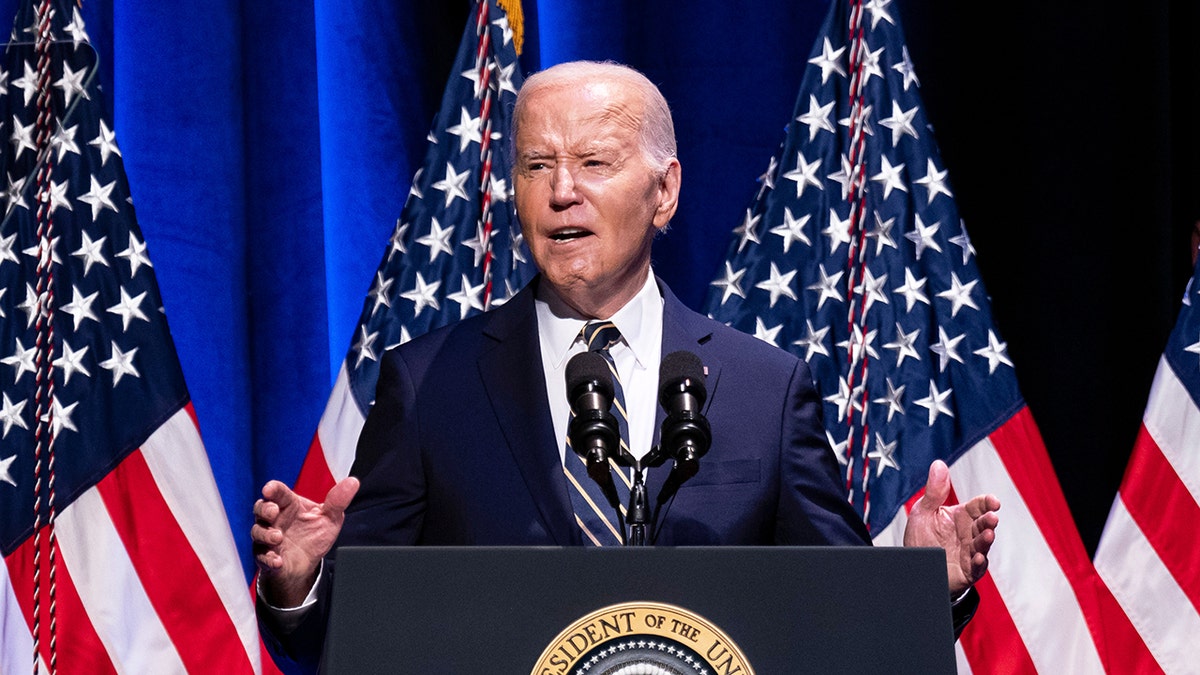
President Joe Biden speaks at the National Museum of African American History and Culture in Washington, D.C, on May 17, 2024. (Al Drago/Bloomberg via Getty Images)
Bates insisted the “MAGAnomics summit puts into relief the stark choice between President Biden’s plan for an economy in which economic growth flows to the middle class, and an economy in which hardworking families are sold out to billionaires and the biggest corporations, forced to pay whatever big corporations want to charge while stripped of the Medicare and Social Security benefits they pay to earn.”
In a statement to Fox News Digital, Karoline Leavitt, the Trump campaign’s national press secretary said, “The Biden campaign is lying because they are losing. President Trump’s first-term pro-growth economic policies created record-low mortgage, interest, and unemployment rates and made inflation virtually non-existent. Americans can expect President Trump’s second-term economic agenda will have the same impact and end Joe Biden’s inflation crisis that continues to rob working families of thousands of dollars every month.”
She added, “President Trump delivered on his promise to protect Social Security and Medicare in his first term, and President Trump will continue to strongly protect Social Security and Medicare in his second term.”
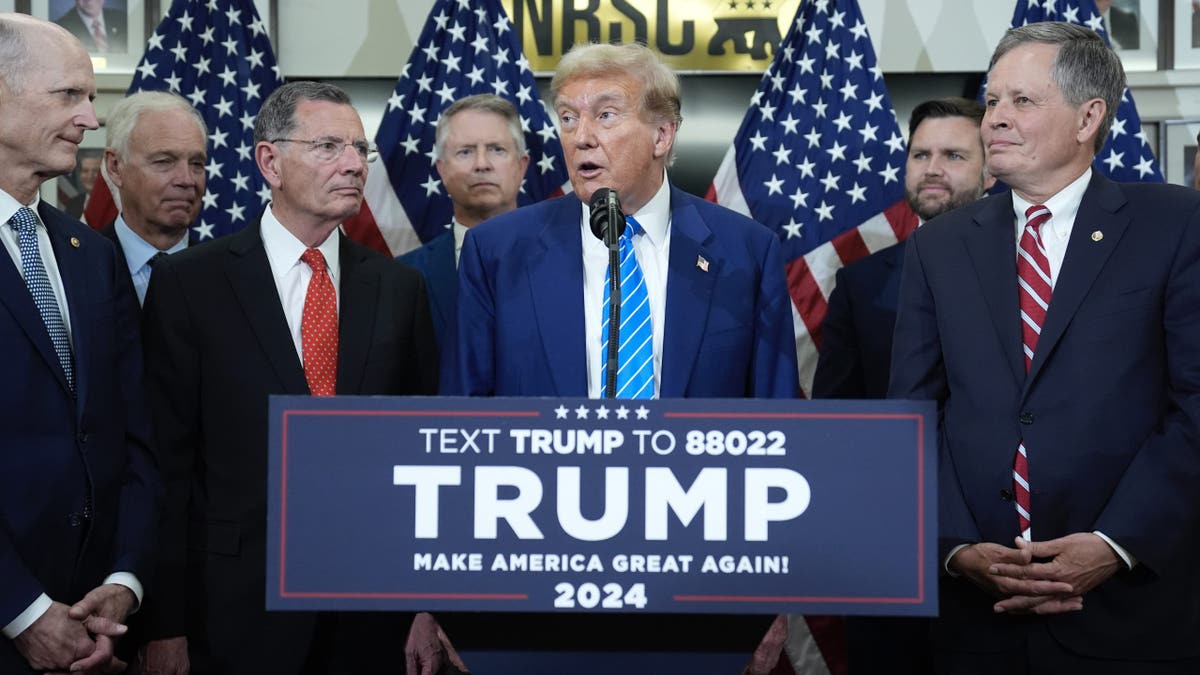
Former President Donald Trump, the presumptive GOP nominee, speaks with reporters at the NRSC on June 13, 2024, in Washington, D.C. (AP Photo/Evan Vucci)
Leavitt insisted the “only candidate who poses a threat to Social Security and Medicare is Joe Biden – whose mass invasion of countless millions of illegal aliens will, if they are allowed to stay, cause Social Security and Medicare to buckle and collapse.”
Trump’s trip to the nation’s capital this week made numerous headlines, as he met for the first time in several years with Senate Minority Leader Mitch McConnell.
Trump told Republican senators that there was tremendous unity in the party, and promised to “bring back common sense to the government” if he’s elected in November.
-

 News1 week ago
News1 week agoIsrael used a U.S.-made bomb in a deadly U.N. school strike in Gaza
-

 News1 week ago
News1 week agoWoman handcuffed in police car hit by freight train reaches $8.5M settlement
-
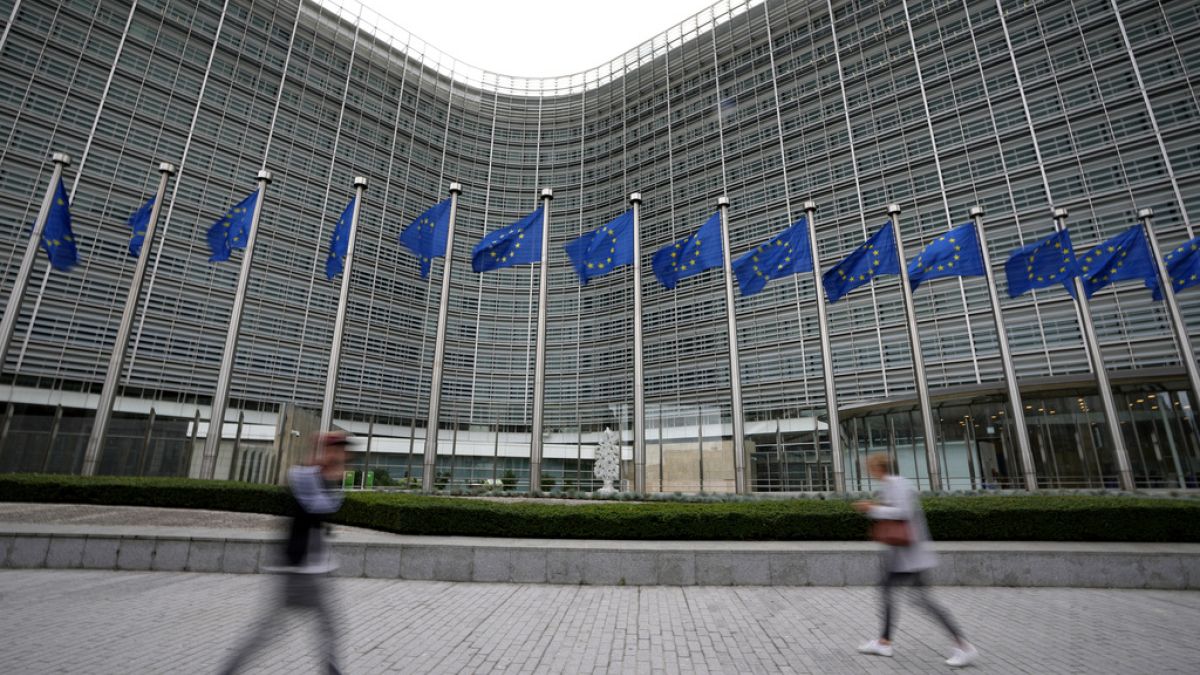
 World1 week ago
World1 week agoEconomy, migration: Voters' main concerns ahead of elections
-
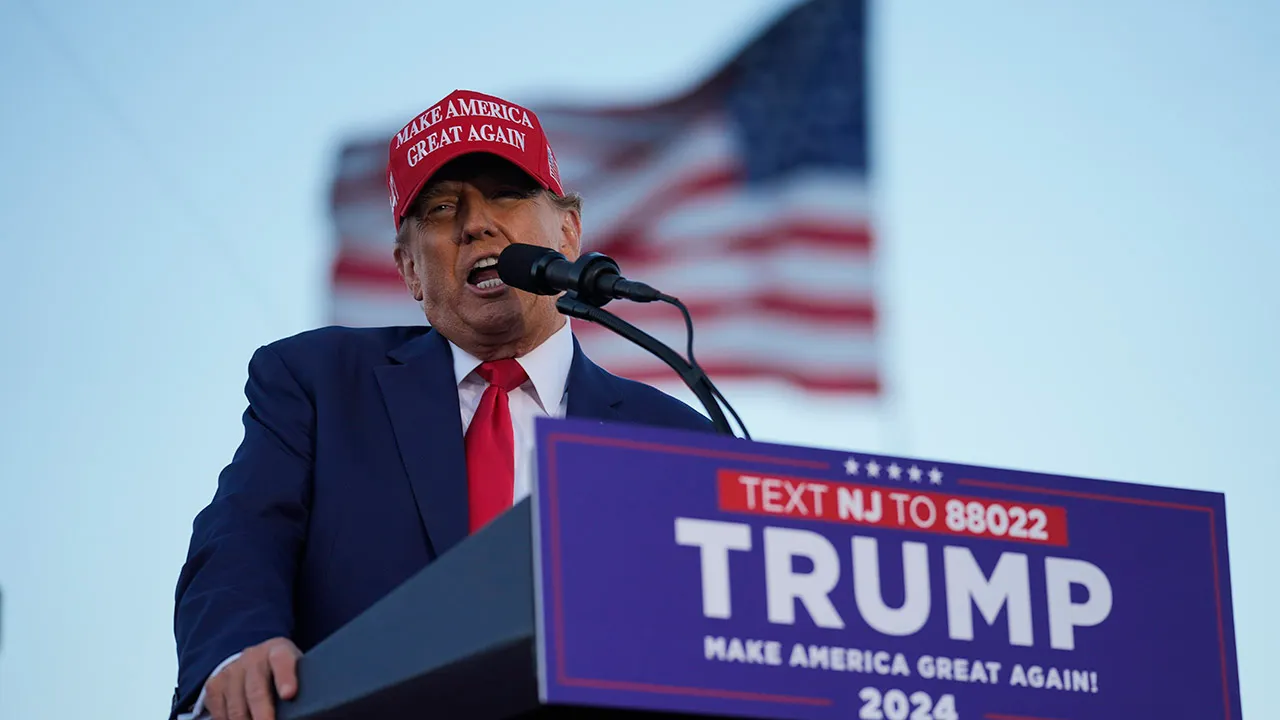
 Politics1 week ago
Politics1 week agoTrump campaign accelerates vetting of potential running mates
-

 Movie Reviews1 week ago
Movie Reviews1 week agoShort Film Review: Blue and White (2022) by Hiroyuki Nishiyama
-

 World1 week ago
World1 week agoFrance to provide Ukraine with its Mirage combat aircraft
-

 World1 week ago
World1 week agoWorld leaders, veterans mark D-Day’s 80th anniversary in France
-

 World1 week ago
World1 week agoRussia-Ukraine war: List of key events, day 833
